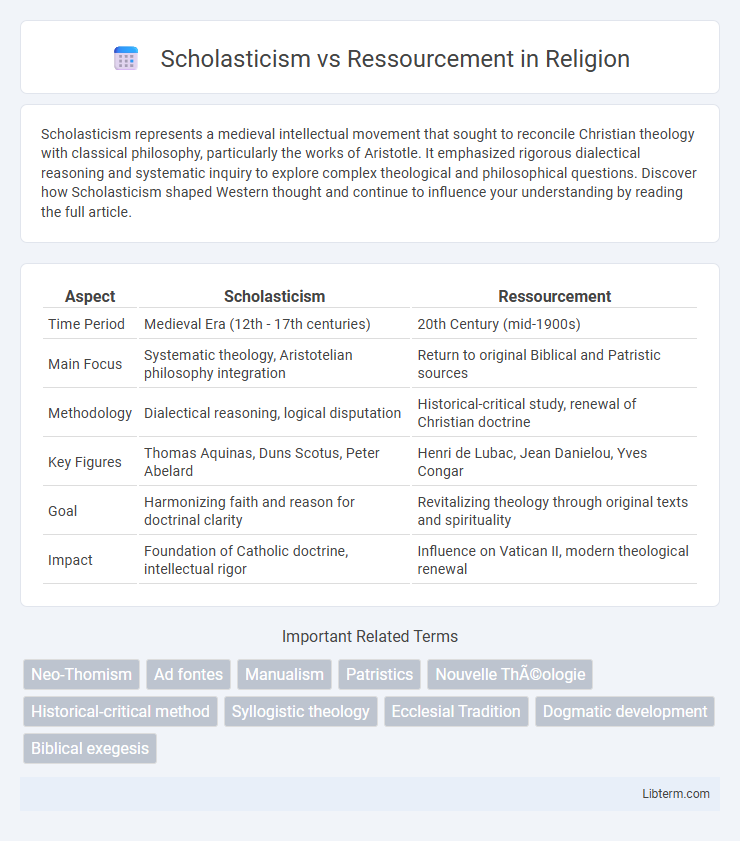Scholasticism represents a medieval intellectual movement that sought to reconcile Christian theology with classical philosophy, particularly the works of Aristotle. It emphasized rigorous dialectical reasoning and systematic inquiry to explore complex theological and philosophical questions. Discover how Scholasticism shaped Western thought and continue to influence your understanding by reading the full article.
Table of Comparison
| Aspect | Scholasticism | Ressourcement |
|---|---|---|
| Time Period | Medieval Era (12th - 17th centuries) | 20th Century (mid-1900s) |
| Main Focus | Systematic theology, Aristotelian philosophy integration | Return to original Biblical and Patristic sources |
| Methodology | Dialectical reasoning, logical disputation | Historical-critical study, renewal of Christian doctrine |
| Key Figures | Thomas Aquinas, Duns Scotus, Peter Abelard | Henri de Lubac, Jean Danielou, Yves Congar |
| Goal | Harmonizing faith and reason for doctrinal clarity | Revitalizing theology through original texts and spirituality |
| Impact | Foundation of Catholic doctrine, intellectual rigor | Influence on Vatican II, modern theological renewal |
Introduction to Scholasticism and Ressourcement
Scholasticism, rooted in medieval European universities, emphasizes rigorous dialectical reasoning and systematic theology to reconcile faith with reason through authoritative texts like Aristotle and Thomas Aquinas. Ressourcement, emerging in the 20th century, advocates a return to the original sources of Christian tradition, such as the Church Fathers and biblical texts, aiming to renew theology beyond the constraints of neo-scholastic frameworks. Both movements shape contemporary theological discourse by balancing historical fidelity with intellectual engagement.
Historical Contexts: Medieval vs. Modern Renewal
Scholasticism, dominant during the Medieval period, emphasized rigorous dialectical reasoning rooted in Aristotelian philosophy and Christian theology, shaping university curricula and theological discourse from the 12th to 17th centuries. In contrast, the Ressourcement movement emerged in the 20th century as a modern renewal within Catholic theology, advocating a return to original sources such as the Church Fathers and Scripture to reinterpret contemporary issues. This historical shift reflects a transition from systematic synthesis and abstract reasoning toward a more historical-critical and pastoral approach in theological scholarship.
Key Figures in Scholasticism
Key figures in Scholasticism include Thomas Aquinas, whose synthesis of Aristotelian philosophy and Christian theology became the cornerstone of medieval Scholastic thought. Anselm of Canterbury contributed the ontological argument for God's existence, emphasizing reason's role in faith. Duns Scotus introduced nuanced metaphysical concepts and refined the understanding of individuation and universals in Scholastic discourse.
Influential Thinkers of Ressourcement
Influential thinkers of Ressourcement such as Henri de Lubac, Yves Congar, and Jean Danielou reshaped Catholic theology by returning to original biblical and patristic sources, emphasizing historical context and spiritual renewal. Their work contrasted Scholasticism's reliance on Aristotelian philosophy and systematic reasoning, advocating instead for a dynamic, living tradition rooted in early Christian writings. This movement heavily influenced the Second Vatican Council, fostering a more engaged and historically grounded theological approach.
Philosophical Foundations: Reason and Faith
Scholasticism emphasizes a systematic approach to theology grounded in Aristotelian logic, prioritizing reason to harmonize faith and knowledge through dialectical methods. Ressourcement seeks to return to original sources of Christian faith, emphasizing a more experiential and historical engagement with Scripture and Church Fathers that balances faith with reason. Both traditions grapple with the relationship between reason and faith, but Scholasticism leans toward rational proof while Ressourcement embraces a dynamic interplay informed by spiritual renewal.
Theological Methodologies Compared
Scholasticism relies on systematic dialectical reasoning, employing rigorous logic and Aristotelian philosophy to reconcile faith with reason, emphasizing authoritative texts and disputation. Ressourcement prioritizes returning to original scriptural and patristic sources, fostering a historical-critical approach that revives early Church thought and engages contemporary contexts. These theological methodologies contrast in their use of tradition, with Scholasticism favoring structured synthesis and Ressourcement promoting dynamic retrieval for renewed theological insight.
Scriptural Engagement: Exegesis and Tradition
Scholasticism emphasizes rigorous logical analysis and systematic reasoning in scriptural exegesis, often relying on established theological authorities and classical philosophical frameworks. Ressourcement advocates a return to the original biblical texts and the Church Fathers, promoting a more historical and contextual engagement with Scripture that renews tradition from its sources. This approach prioritizes living interpretation and the dynamic relationship between Scripture and Tradition for contemporary theological understanding.
Impact on Catholic Doctrine
Scholasticism emphasized systematic theology through Aristotelian logic, shaping Catholic doctrine by reinforcing rational clarity and dogmatic precision during the Middle Ages. Ressourcement, emerging in the 20th century, revitalized Catholic doctrine by returning to original scriptural sources and Church Fathers, fostering a dynamic and pastoral approach. This shift influenced Vatican II reforms, promoting a more historically conscious and dialogical understanding of church teachings.
Critiques and Debates between the Movements
Scholasticism faced critiques from Ressourcement thinkers who argued it was overly rigid and disconnected from early Church sources, emphasizing instead a return to the original biblical and patristic texts for authentic theological renewal. Ressourcement scholars challenged the abstract dialectical method of Scholasticism, advocating a more historical and experiential approach to theology that engaged with Scripture and tradition in their original contexts. Debates centered on the balance between systematic reasoning and historical faith development, with Ressourcement influencing Vatican II's shift toward ressourcement principles in Catholic theology.
Contemporary Relevance and Future Directions
Scholasticism's contemporary relevance lies in its rigorous analytical methods and systematic theological frameworks, which continue to influence modern Christian philosophy and ethics. Ressourcement, emphasizing a return to early Church sources and patristic theology, shapes current ecumenical dialogues and revitalizes liturgical and spiritual practices within the Catholic Church. Future directions suggest an integrative approach blending Scholastic precision with Ressourcement's historical depth to address complex moral and doctrinal challenges in a pluralistic global context.
Scholasticism Infographic

 libterm.com
libterm.com